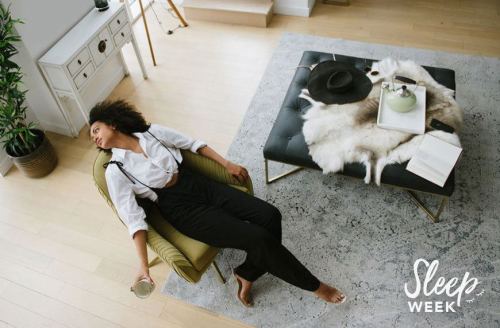For the love of energy, why am I TATT (tired all the time) despite sleeping 7 hours every night?
I can't stop wondering why I'm exhausted all the time. I get seven hours of sleep but still have low energy. An expert weighs in about causes of tiredness.

I have not experienced every sensation available in the human experience, but I imagine persistent exhaustion—one I most definitely have felt—is up at the top of the list of the most terrible feelings. To paraphrase a prolific poet of my generation (memes in general), being an adult means telling everyone how tired you are all the time. I relate so hard. What’s crazy though is that I frequently get seven to eight hours of sleep…sometimes more. Yet I still have trouble getting out of bed in the morning, and I feel fatigued during the day.
This is by no means a unique experience. According to the UK NHS, feeling tired all the time is so common, it has its own freaking acronym: TATT (tired all the time). And a recent Well+Good survey of nearly 1,500 people about sleep habits found that and 92 percent of respondents feel fatigued more than one day per week. But—plot twist!—on average, the people surveyed were getting seven hours of sleep, i.e., very close to the amount recommended by the CDC. So what gives? Why are we all so exhausted if we’re getting the right amount of sleep? Le major sigh.
The main culprits behind fatigue—aside from, you know, not getting enough sleep—all have common denominator of disrupting your quality of sleep. In other words, you could be logging the right quantity of sleep, but not the right quality. Here, licensed psychologist and sleep-health expert Shelby Harris, PsyD, breaks down common reasons why we’re feeling so exhausted, even if we get enough rest.
3 reasons you’re chronically tired that have nothing to do with time in bed
1. Your beverage choices are poorly timed
Basically, the fun stuff—wine and coffee—could be disrupting your sleep quality. “Alcohol, liquids, and cigarettes within three hours of bed, and caffeine within eight hours of bed can disrupt your sleep quality for sure,” Dr. Harris says. “Alcohol and cigarettes lessen the depth of your sleep and makes it more shallow altogether, leading to quick awakenings and less restorative sleep. Caffeine does the exact same thing as well—even if you fall asleep fine at the beginning of the night.” And drinking liquids before bed can contribute to reasons you have to pee in the middle of the night.
2. It’s your anxiety (because isn’t it always?)
“Anxiety, stress, and depression can cause one’s brain to essentially be ‘on’ more at night, leading to more shallow sleep and less restorative sleep,” Dr. Harris explains. “It can also lead to one feeling fatigued and sleepy during the day.” That’s because anxiety, stress, and other mental health issues can have very real physical symptoms—one of which is fatigue.
3: There’s a medical factor at play
Dr. Harris says you should see a specialist if you’re snoozing long enough and have cut out the aforementioned liquids at the appropriate time, yet remain tired all. the. damn. time. Fatigue shouldn’t be something you just have to plow through while living in a perpetual state of near burnout.
Oftentimes, sleep apnea is a culprit, and many might not know they have it until they do a sleep study. “Sleep apnea is snoring and typically choking/gasping/pauses in breathing throughout the night that the person who has it usually has no idea it is going on. This leads to multiple quick awakenings throughout the night but an immediate return to sleep and amnesia for the awakenings,” Dr. Harris explains.
Other factors potentially compromising your sleep quality may include teeth grinding, vivid dreams, nightmares, or leg movements, she says. A sleep specialist can also help diagnose these. Armed with this knowledge you may be one step closer to saying goodnight to chronic fatigue once and for all.
In other sleep-related news, your insomnia could be genetic. But ASMR might be the magic X-factor missing from sleep routine. Here’s why one writer swears by the practice.
Sign Up for Our Daily Newsletter
Get all the latest in wellness, trends, food, fitness, beauty, and more delivered right to your inbox.
Got it, you've been added to our email list.










